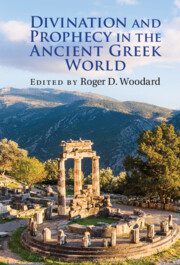Book contents
- Divination and Prophecy in the Ancient Greek World
- Divination and Prophecy in the Ancient Greek World
- Copyright page
- Contents
- Contributors
- Acknowledgments
- Abbreviations
- General Introduction
- 1 Greek Divination as the Transformation of an Indo-European Process
- 2 On Divinatory Practices and la raison des signes in Classical Greece
- 3 Oracle and Client
- 4 Oracular Failure in Ancient Greek Culture
- 5 The Dynamism of Mouvance in the Pronouncements of the Delphic Oracle
- 6 Decentralising Delphi: Predictive Oracles, Local Knowledge and Social Memory
- 7 Oracular Tales before Historiography
- 8 Omens and Portents Foretelling Victory and Defeat: Ontological, Literary, and Cognitive Perspectives
- 9 The Use of Divination by Macedonian Kings
- 10 False Prophets and Fake Prophecies in Lucian
- 11 Afterword
- Bibliography
- Index
9 - The Use of Divination by Macedonian Kings
Published online by Cambridge University Press: 22 December 2022
- Divination and Prophecy in the Ancient Greek World
- Divination and Prophecy in the Ancient Greek World
- Copyright page
- Contents
- Contributors
- Acknowledgments
- Abbreviations
- General Introduction
- 1 Greek Divination as the Transformation of an Indo-European Process
- 2 On Divinatory Practices and la raison des signes in Classical Greece
- 3 Oracle and Client
- 4 Oracular Failure in Ancient Greek Culture
- 5 The Dynamism of Mouvance in the Pronouncements of the Delphic Oracle
- 6 Decentralising Delphi: Predictive Oracles, Local Knowledge and Social Memory
- 7 Oracular Tales before Historiography
- 8 Omens and Portents Foretelling Victory and Defeat: Ontological, Literary, and Cognitive Perspectives
- 9 The Use of Divination by Macedonian Kings
- 10 False Prophets and Fake Prophecies in Lucian
- 11 Afterword
- Bibliography
- Index
Summary
Macedonian kings used four methods of divination common among the Greeks – extispicy and other sacrifices, teratology, oneiromancy, and oracles – and resembled the Greeks in regard to when and how they consulted seers. The evidence mainly concerns Alexander III but allows conclusions to be drawn about traditional Macedonian royal practice. This practice differed from Greek divination on two counts: the employment of Egyptian and Babylonian seers by both Alexander and his Successors and the combination of royal divination with ruler cult; in other words, the combination of some sacrifices made by or for Macedonian kings with sacrifices made to them as quasi-divine beings. Demetrius Poliorcetes illustrates the perils of combining divination and ruler cult. This chapter also surveys Macedonian divinatory personnel, notably Aristander of Telmessus, Alexander’s chief seer, but also including unnamed Babylonian seers employing astrological methods foreign to the Greeks and Macedonians.
- Type
- Chapter
- Information
- Divination and Prophecy in the Ancient Greek World , pp. 219 - 239Publisher: Cambridge University PressPrint publication year: 2023
- 1
- Cited by

